India’s Nanotechnology Policy | Science & Technology for UPSC CSE PDF Download
| Table of contents |

|
| Nanotechnology Initiative Division |

|
| Capacity Building |

|
| Major Research Output |

|
| Recent Developments (2025) |

|
Nanotechnology Initiative Division
- Nanotechnology involves studying and creating materials and devices at an incredibly small scale, typically between 1 to 100 nanometers. To put this in perspective, 1 nanometer is one-billionth of a meter.
- This technology has the potential to revolutionize various sectors, including electronics, healthcare, environmental science, and agriculture, by manipulating matter at the atomic and molecular levels.
Impact on Electronics
- Nanotechnology is significantly transforming the field of electronics. While advancements in silicon technology continue to drive progress in micro and nanoelectronics, there are instances where non-silicon materials offer better performance.
- Modern material growth techniques allow for the fabrication of multilayered nanostructures and devices made from different materials with nanoscale thickness.
- This capability opens up new possibilities for creating advanced electronic components with enhanced properties.
- Additionally, nanotechnology-enabled sensors are revolutionizing physical, chemical, and biological sensing. These sensors offer increased detection sensitivity, integration capabilities, and portability, making them suitable for a wide range of applications, including health, safety, and environmental monitoring.
Government Initiatives in India
The Indian government, through the Ministry of Electronics and Information Technology (MeitY), has launched several initiatives to promote research and innovation in nanoelectronics.
- Establishment of Nanoelectronics Centres: Internationally recognized Nanoelectronics Centres have been set up at premier institutes in India. These centres are equipped with state-of-the-art nanofabrication facilities that are in high demand both domestically and internationally.
- Indian Nanoelectronics Users Programme (INUP): Initiated by MeitY, INUP provides researchers across India access to advanced nanofabrication facilities at the Centre of Excellence in Nanoelectronics (CEN) at the Indian Institute of Science (IISc) and the Indian Institutes of Technology (IITs) Bombay and Kharagpur. This program focuses on research and skill development in nanoelectronics, offering hands-on training to around 400 researchers annually.
Research and Development
- The research activities conducted at these centres have led to numerous publications and innovations, with several patents filed for the developed technologies.
- Some technologies developed at the CENs have been licensed to Indian start-up companies, while collaborations with national laboratories have resulted in the development of strategic applications.
- The centres are also beginning to engage with industry partners to create new technologies and products for large-scale manufacturing and commercialization.
Focus on Semiconductor Manufacturing Ecosystem
- The Nanotechnology Initiatives Division is focused on building an ecosystem for semiconductor manufacturing in India through cutting-edge research projects.
- This initiative aims to strengthen India’s capabilities in semiconductor technology, which is crucial for the country’s technological advancement and self-reliance in electronics and related fields.
On-going Projects
- “Nanoelectronics Network for Research and Applications (NNetRA)” at IITB, IITD, IITM, IITKrg and IISc, Bangalore
- Centre of excellence in Research and Development of Nanoelectronic Theranostic Devices, at IIT Guwahati
- Indian Nanoelectronics Users Programme Phase II, at IISc. Bangalore http://www.nano.iisc.ernet.in/inup/(link is external)
- Indian Nanoelectronics Users Programme Phase II, at IIT Bombay. http://www.inup.iitb.ac.in/inup/index.php(link is external)
- Nano Fabrication Prototyping Facilities for SMEs and Start-ups in the area of MEMS and NEMS, at IIT Bombay
- Three-Dimensional Nanostructure based Miniaturized and Flexible rechargeable lithium batteries for flexible electronics” at Centre for Materials for Electronics Technology (C-MET), Pune
- Demonstration of LED by Pulsed Laser Deposition (PLD) technique, at University of Delhi New Delhi
Completed Projects
- Centre of excellence in nanoelectronics at IIT, Bomba
http://www.cen.iitb.ac.in/cen/index.php(link is external) - Centre of excellence in nanoelectronics at IISc, Bangalore
http://www.nano.iisc.ernet.in/(link is external) - Indian Nanoelectronics Users Programme at IIT, Bombay.
http://www.inup.iitb.ac.in/inup/index.php(link is external) - Indian Nanoelectronics Users Programme at IISc, Bangalore.
http://www.nano.iisc.ernet.in/inup/(link is external) - Generic development of nanometrology for nanotechnology, at NPL Delhi
- III/ V Compound Semiconductor based Quantum Dots Technology, at IISc Bangalore
- Synthesis of Nano Particles of Noble and Transition Metals for Application in Electronic Packaging and Optoelectronics, at C-MET Pune
- Large-scale Generation of Nanosized Metals /Metal oxides/ Metal nitrides in a Transferred Arc Plasma Reactor, at C-MET Pune
- Investigations and Development of Nano Silver Oxide for Optical Memories, at IIT Madras
- Development of Nanocrystalline Silicon MEMS Pressure Sensor for Vacuum and low pressure applications, at Jadavpur Univ., Kolkata
- Development of technology for quantum structures & their applications in futuristic silicon based nanoelectronic devices, at CEERI Pilani
- Fabrication of new photolithography -less vertical organic thin film transistors (OTFT), at IIT Kanpur
- Development of Quantum-Well Infrared Photodetectors in wave-length range 8-14 μm using Si/SiGe Nanotechnology, at IIT Kharagpur
- Investigation of alignment & Characterization of Carbon Nano tubes for targetted drug delivery, at CSIO Chandigarh
- Synthesis of nanocrystalline SnO2 powder and preparation of nanostructured SnO2 thin films for gas sensing by Ultrasonic Spray Pyrolysis technique, at Pratap College Amalner
- Synthesis of Aligned Nanotubes of Carbon and related materials and study of their Electron Emission Characteristics, at IIT Delhi
- Modeling and Simulation of Nanoscale MOSFETs at Room Temperature (RT) and of Classical MOSFETs at Liquid Nitrogen Temperature (LNT), at Punjab University Chandigarh
- Nano-sized SiC based quantum structures on Si by Spin-on techniques, at IIT Kanpur
- Q-semiconductor-glass-nanocomposites for optical and energy (using solar light) application, at C-MET Pune
- Raman & Photoluminescence Investigation of Nanostructured Porous silicon for sensing the presence of Chemical and Biological Species, at Jamia Millia Islamia New Delhi
- Characterization and Simulation of Nanodevices at VNIT, Nagpur
- Oxide Based Functional Thin Film Nanostructures for Spintronics and quantum Informatics, at IIT Kanpur
- Novel Nano-structured Ceramics for Gas Sensing Applications, at IIT Kharagpur
- Synthesis & Characterization of Functional Nanostructures for MEMS & Optoelectronic Applications, at IIT Roorkee
- Preparation of Directed self-assembly of GaN, InGaN based Quantum Dots suitable for fabrication of LEDs, at Anna University Chennai
- Studies on Surface Plasmon Resonance Enhanced Fluorescence of Nano Silver Oxide doped/mixed with Gold and Copper for Ultra High Density Optical Memories, at IIT Madras
- Nanostructured materials and devices of wide band gap semiconductors, at IISc. Bangalore
- Development of Carbon Nanotubes based Gas Sensor, at Jamia Millia Islamia New Delhi
- Growth of Single Wall Carbon Nano Tubes for Semiconducting Applications, at Jamia Millia Islamia, New Delhi
- Research Initiative on Non-Silicon based Technologies for Nanofabrication and Nanoscale Devices, at IIT Delhi.
http://nano.iitd.ac.in/(link is external) - Centre for Nanomechanical Systems (NEMS) and Nanophotonics, at IIT Madras.
http://www.ee.iitm.ac.in/ - Development of MBE cluster tool based epitaxial nano-semiconductor infrastructure and process integration facility for high performance RF/Microwave compound semiconductor heterostructure nano-devices on silicon, at IIT Kharagpur
- Development of Multifunctional magnetic nanoparticles for cancer, at IIT Bombay
- Cost Effective Synthesis of Graphene and metal incorporated Graphene their application as Sensors of environmental gases, at SMIT Majitar
- Development of Nano ZnO and SnO2 through Green Route for Sensor Devices, at SRIVT Guntur Andhra Pradesh
- Centre of excellence in nanoelectronics Phase II, at IIT Bombay.
http://www.cen.iitb.ac.in/cen/index.php(link is external) - Centre of excellence in nanoelectronics Phase II, at IISc Bangalore. Rich in nanoelectronics, developing products/ devices for meeting the societal requirements in the country and creating world class fabrication facilities at Nano level.
Following are the thrust areas identified by the Working Group of Nanotechnology:
- Post Moore Electronics beyond 10 nm
- Sensors (health, agriculture, security etc.)
- Organic Electronics
- Computational Nanoelectronics
- Setting up prototyping and incubation facilities for a range of devices/products
Capacity Building
Nanotechnology Programme has been concentrating mainly on following to make India a front runner in the field of Nanotechnology.
- Infrastructure for Research and Development / Institutional capacity building
- Human Resource Development in the Area of Nano-Electronics
- Development of Nano devices/subsystem/system for various applications
A major initiative has been taken to create the Nanoelectronics Centres at various places in India to provide access to professional expertise, training and development, supporting collaborations.
Centres of Excellence in Nanoelectronics - Phase I and Phase II: a joint project between IISc, Bangalore and IIT Bombay
Centre for Excellence in Nanoelectronics project (CEN) has been established at IISc and IIT-B with the state-of-the-art nanofabrication facilities of international standards providing a catalyst for ambitious research initiatives in area of Nanoelectronics. The project CEN Phase II is a natural extension of CEN and was initiated in January 2012 to be jointly implemented by IISc Bangalore and IIT Bombay to accelerate research and development activities in new areas of nanoelectronics, nano-materials and nano-structures and integrated sensor system, and to generate a critical mass of highly trained manpower to propel these areas.
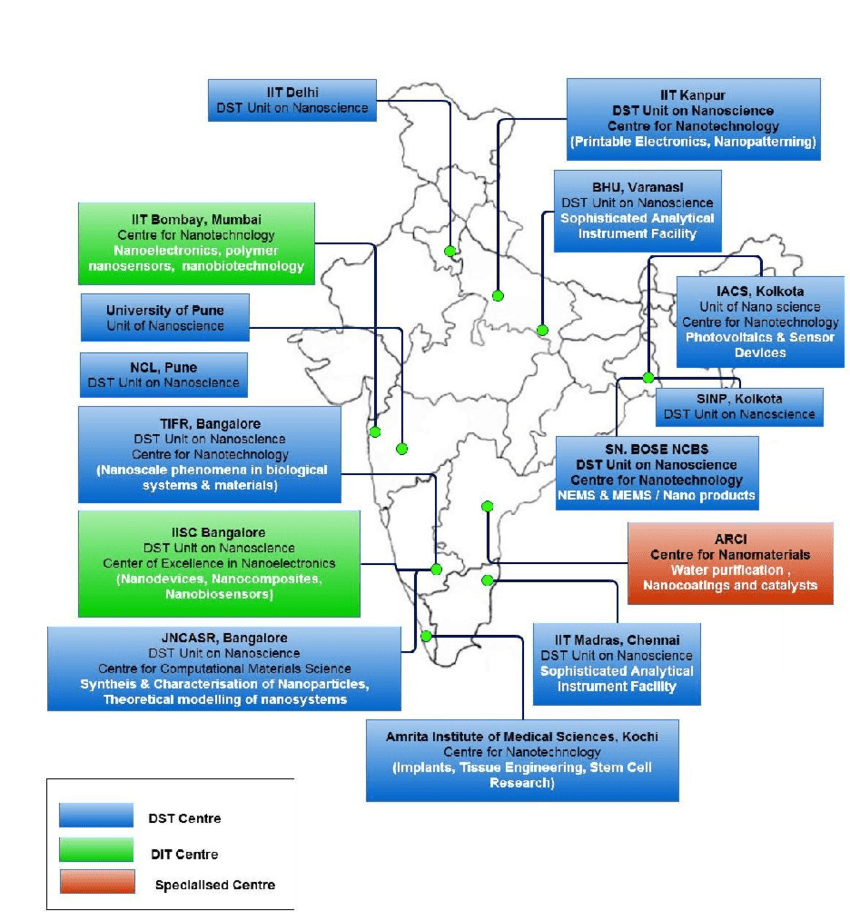 CENs
CENs
Indian Nanoelectronics User Programme Phase I and Phase II (INUP Phase II) at IIT Bombay and IISc, Bangalore
A unique joint major project entitled "Indian Nanoelectronics Users Program (INUP)" was launched to make available the CEN facilities created at IISc and IIT-B to researchers from all over the country for experimental research using nanofabrication. The major highlights of the project include the following: Imparting a hands-on training in nanoelectronics, assistance in research by enabling execution of work of external users at these centres, collaborating with research teams from other Indian centres to develop joint programs in nanoelectronics, provide a platform to researchers in Nanoelectronics to come together and benefit from complimentary expertise and conduct regular workshops for a wider dissemination of knowledge in Nanoelectronics. In addition to this, human resources are being created in all the R&D projects under this programme.
INUP Phase II was initiated in March 2014 at the CENs of IISc Bangalore and IIT Bombay to continue to facilitate and support the generation of expertise and knowledge in Nanoelectronics through participation by external users in INUP and their utilization of the facilities established at the Centres of Excellence in Nanoelectronics (CEN) at IISc and IITB. The reach of INUP will be extended to a larger number of researchers through a variety of new and expanded initiatives for advanced training and research. Till date around 3000 manpower has been trained, 20 patents have been filed, 250 research papers have been published and 150 Ph.D thesis have been supported under the programme.
Research Initiative on Non-Silicon based Technologies for Nanofabrication and Nanoscale Devices at IIT Delhi
This project involves setting up of a nanofabrication facility at IIT Delhi for developing Nanofabrication processes and their use for making non-silicon nanoscale devices. The project also aims on building and demonstration of select device prototypes in specific research areas.
 NRF, IIT Delhi
NRF, IIT Delhi
Centre for Excellence in Research and Development of Nanoelectronic Theranostic Devices at IIT Guwahati
The aim of the Centre is to develop facilities for fabrication and characterization of micro/nano electronic devices aiming applications in Theranostics (a combined terminology for therapeutics and diagnostics) with focus on the development of surface acoustic wave (SAW) devices, MEMS/NEMS prototypes, and FET devices applicable for (i) pathogen detection (ii) diagnostic tools for biochemical assays (iii) diseases such as pancreatitis (iv) markers for cancer diagnosis and (v) sensor for whole cell detection etc. Esophageal, hypo pharyngeal and oral cancers are common, probably due to the habit of consumption of betel-nut (Areca nut) and higher use of alkaline food, in the North East, India. The Centre will provide the new opportunities to the researchers of North Eastern region and will cater to the local needs by the development of low cost health and agriculture sensors.
Centre for Nanoelectromechanical Systems (NEMS) and Nanophotonics at IIT Madras
Under the project, a Centre for Nano-electromechanical Systems (NEMS) and Nanophotonics has been set-up. Centre is pursuing R&D to achieve the following Specific components/ devices / subsystems/ systems:
- RF Blade Nanoresonator
- Biomolecular Detection System using Silicon/ Silicon Nitride Nanoresonator and Nanoporous membrane based particle sensor
- Nanophotonics components/ systems based on Silicon on Insulator (SOI)
- Nanophotonics components/ systems based on GaAs/ AlGaA
- Lamellar gratings for Fourier Transform Spectroscopy (FTS) Systems
The aim of the project is to promote Nanotechnology in areas of health, food safety, communication and material science.
Nano Fabrication Prototyping Facilities for SMEs and Start-ups in the area of MEMS & NEMS at IIT Bombay
The main aim of the project is to set-up a Centre for Prototyping and Testing of Nano-Sensors and to provide a facility to fabricate and manufacture Nano-Scale devices by Incubator Companies, Industry participants, researchers at IIT Bombay & other academic institutions including other government agencies. Such a facility will enable these entities to take their products from research labs to the market. The project is expected to facilitate production of products for health care and environment monitoring.
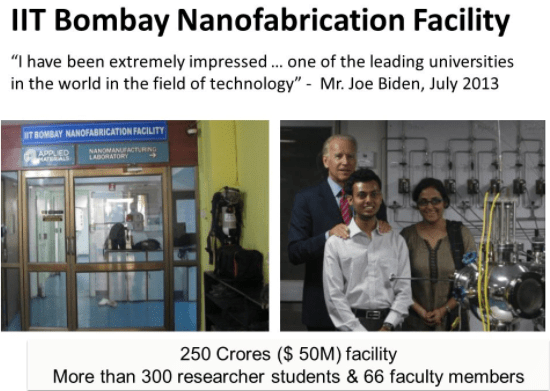 NFP, IITB
NFP, IITB
Nano-metrology at National Physical Laboratory, New Delhi
Calibration facilities for the measurement of electrical parameters such as voltage, current, resistance and charge in nano range have been established to serve as a national facility in NPL, New Delhi.
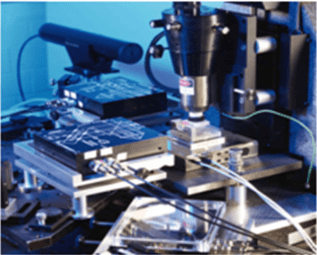
Development of MBE Cluster Tools for the epitaxial growth at IIT Kharagpur
MBE cluster tool based epitaxial nano-semiconductor infrastructure facility has been established for high performance RF/Microwave compound semiconductor heterostructure nano-devices on silicon for common user access. This project concentrate on developing the Ge rich SiGe process on Si, Arsenide process (GaAs) on Si, Phosphide process (InP) on Si and Nitride process (GaN) on silicon.
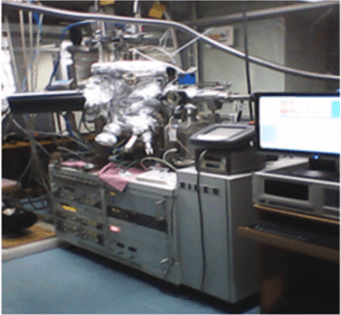 MBE cluster tool at IIT Kharagpur
MBE cluster tool at IIT Kharagpur
Major Research Output
A few of the technologies developed successfully at Centre for excellence IISC, IITB, IITM, IITD under the Nanotechnology Programme are:
Diabetes, Anaemia and Malnutrition, Kidney and Liver disease Monitoring system
Based on electrochemical biosensors research carried out at the Centre for Nano Science and Engineering (CeNSE), a Start-up company PathShodh Healthcare Pvt Ltd has been incubated at IISc Bangalore. PathShodh has introduced first of its kind handheld device with the capability to measure multiple biomarkers specifically targeting Diabetes and its complications, Kidney disease, Anemia and Liver related ailments. The product has already been deployed in the field and is currently going through ISO 13485 and CE certification.
PathShodh's existing platform technology, "anuPath (TM)", to measure multiple bio-markers is proposed to be redesigned and validated to test COVID-19. Since, there is no strip based test available for COVID-19 at present anywhere in the world, a disposable test strips utilizing a novel receptor chemistry to perform highly accurate and sensitive COVID-19 antibody (IgG and IgM) test is proposed. The test may be done with tiny finger prick blood sample in shorter time at substantially low cost lesser than ELISA kit. For more details visit: https://pathshodh.com/media.php
Portable Polymerase Chain Reaction (PCR) Platform
Under the NNetRA project funded by MeitY, a Polymerase Chain Reaction (PCR) System to detect blood related diseases has been developed by IISc to detect Malaria and other blood related diseases. The system uses PCR-Thermal Cyclers in conjunction with adapter chain and fluorescence reader unit. Technology for the same has been transferred to a Start-up Shanmukha Innovations Pvt. Ltd incubated at IISc for its commercialization.
This start-up would be developing portable molecular diagnostic lab for COVID-19 testing. Instead of existing RT-PCR for testing COVID-19, it uses PCR-Thermal Cyclers in conjunction with adapter chain and fluorescence reader unit, considered equivalent to that of gold standard technology namely RT-PCR. The system would enable shorter turn-around-time compared to 24-72 hours with central labs with capability of processing and testing larger number of samples/day/unit.
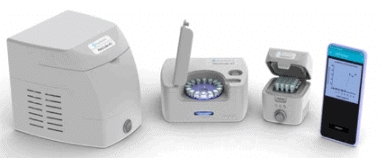 Portable PCR system
Portable PCR system
Gas Sensors
Under the NNetRA project of MeitY, Gas sensors (for multiple identified gases NO2, O2 and N2H4 and H2) have been developed by IISc Bangalore with the following deliverables:
- Scaling up of metal oxide gas sensor technology for routine production.
- Long term reliability assessment of metal oxide gas sensors.
- Field deployment of gas sensors with potential partners from strategic sectors and industry.
- SCL, Mohali has been given the technology for the development of NO2, O2 and N2H4 and H2 sensors for strategic applications. Field trials of these sensors have already been performed at SHAR, Sriharikota. The sensors are also undergoing field trials for their possible use in railway coaches.
- Since N2 and O2 gases are mixed in different ratios in ventilator, it is important to measure the precise concentration of O2 in the gas pushed by ventilator into patient’s lungs. In a very short time, using 3D printed package, the project team was able to deliver O2 gas sensor chip to be used in ventilators.
- This sensor chip is also being used in another project on “Oxygen concentrator”, to generate 100% oxygen from ambient air by filtering N2 gas out in a membrane.
Portable Imaging Flow Cytometer for Malaria Detection
Microfluidic chip with channels on PDMS/PC/PMMA, to detect the flow of PS beads/cells through the channels are used for flow cytometry system for blood cell counting of at least 20 L/min with integrated optical system consisting of Light Emitting Diode (LEDs) of nominal wavelength 633 nm and 488 nm with a power of 10-20 mW. Two prototypes have been developed using microfluidics technology, one on cell phone and another on the digital camera platform.
Soil moisture sensor
Two prototypes for soil moisture sensor developed and tested – one with Temperature pulse probe and second with electrochemical potential principle. Also a cantilever based soil moisture sensor system has been developed which has a wireless connectivity. Further work is continued on the instrumentation aspects of wireless sensor nodes for agricultural systems.
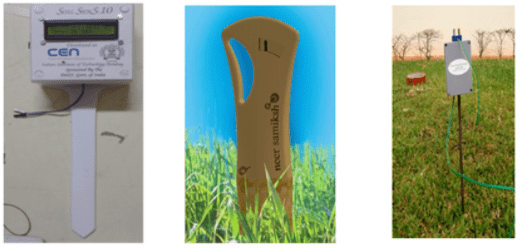
Explosive Vapour Sensor
Explosive Vapour Sensor using poly (3-hexylthiophene) and Cu-tetraphenyl-porphyrin composite based organic field effect transistor has been developed. This technology can detect vapours of explosives.
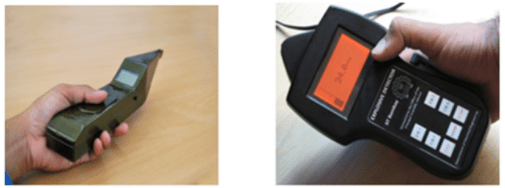
Gas Sensor Array for Environmental Pollution Monitoring
A 4 element Metal oxide gas sensor array chip has been developed to sense CO2 gas in the range of 350 ppm to 1000 ppm. The sensor consumes extremely low power of about 50mW for 4 sensors, and is selective against gases such as SO2, CO and NOx.
A low cost sensor platform for determining ionizing radiation using sensors based on organic semiconducting materials has been demonstrated
Health Care – Silicon Locket
A web enabled efficient and intelligent remote health care system for cardiac diagnostics entitled ‘Silicon Locket’ has been developed.
MEMS pressure sensor
Design, fabrication and testing of a Nanocrystalline silicon MEMS pressure sensor in the range of 1 mbar to 1 bar.
Neuroelectronics
A top down process has been developed to create transistors with nano needles on top of the gate oxide, to sense intracellular action potential. The process is capable of creating array of Nano needle Gated FETs (NGFETs).
Envirobat Wireless Sensor for Air Quality
A system prototype of wireless sensor for air quality has been developed for environmental monitoring with following capabilities:
- Real time sensors for CO, CO2, SO2, NO2, humidity, temperature,
- Wireless transmission of sensor data through GSM link
- On board memory for data logging
- Server side software for data analysis and rendering
- Probing each of the device in a deployed Envirobat network
Patents
About 70 patents have been filed under the projects sponsored by Nanotechnology Division. Some of the filed patents are as follows:
- “Regioregular Conjugated Polymers Based on 3, 4-b-diheteropentalenes” Anil Kumar, Indian Patent.
- “Regioregular Conjugated Copolymers Based on Thieno[3,4-b]thiophene and process for preparation of same” Anil Kumar, Indian Patent.
- “Nickel (0) Catalyzed Kumada Chain Transfer Polycondensation” Anil Kumar, Indian Patent.
- “A Novel Process to get highly Conducting and Highly Transparent Thin Films and its Applications as Transparent Conductor” Anil Kumar, Smita Mukherjee, Indian Patent.
- “Novel Homogeneous Nickel (II) Catalyst” Anil Kumar, Indian Patent.
- “Automated Clinical Microscopy by Image‐based Flow Cytometer for Analyzing Substances and a Method Thereof” by Sai Siva Gorthi and Veerendra Kalyan Jagannadh. Indian Provisional Patent.
- “Double Quantum Well Enhancement Mode Nitride HEMT” Indian Patent.
- “An Improved Molecular Beam Epitaxy Multi Chamber Cluster Tool and Processes For Integration Of Multiple Growth Combination Of Group III-V Semiconductor Heterostructures”. Indian Patent.
- Novel Ways of Introducing High Voltage Handling Capabilities in FinFET Technologies – US patent.
- Sandwich Tunneling Barrier FET - US patent. An N-Type Tunnel-FET device with strained SiGe layer at source - Indian Patent
- A sub-threshold forced plate FET sensor for sensing inertial displacement, a method and system thereof - Indian Patent
- A sub-threshold elastic deflection FET sensor for sensing pressure/force, a method and system thereof - Indian Patent
Recent Developments (2025)
- The National Nano Mission is now integrated under the Anusandhan National Research Foundation (ANRF), aligning nanotechnology with semiconductor, quantum, and advanced materials research.
- Nanoelectronics Network for Research and Applications (NNetRA) expanded with new centres at IIT Hyderabad and IIT Bhubaneswar, focusing on flexible electronics, photonics, and quantum nanodevices.
- INUP-C2C (Chips-to-Startup) model introduced to link nanoelectronics research with semiconductor startups and fabrication services.
- Research focus expanded to 2D materials (graphene, MoS₂), quantum dot computing, nano-enabled energy storage, nanomedicine, nanoagriculture, and wearable nanodevices.
- Over 30 Indian startups active in nanotechnology across healthcare, water purification, and energy devices, supported by new nano-incubators and defence collaborations for stealth coatings and lightweight armour.
- Strengthened international collaborations with EU Horizon Europe, US NSF, and Japan’s NIMS; India joined the International Alliance on Responsible Nanotechnology Governance in 2024.
- BIS nano-safety standards and nano-lab certification protocols introduced to ensure occupational safety and product toxicity assessments.
- Nanotechnology integrated with the National Quantum Mission, National Green Hydrogen Mission, and Clean Energy Mission for applications like quantum sensors, nano-catalysts, and nano-enabled solar cells.
- Key recent achievements include graphene-based supercapacitors for EVs, nano-enabled water filters in fluoride-affected regions, nano-sensor IoT networks for smart cities, and 3D-printed nano-bio scaffolds for regenerative medicine.
|
91 videos|516 docs|212 tests
|
FAQs on India’s Nanotechnology Policy - Science & Technology for UPSC CSE
| 1. What is the Nanotechnology Initiative Division in India? |  |
| 2. What is the objective of India's Nanotechnology Policy? |  |
| 3. What are the key initiatives taken by India's Nanotechnology Initiative Division? |  |
| 4. How does India's Nanotechnology Policy support the development of nanotechnology startups? |  |
| 5. How does India's Nanotechnology Policy address the ethical and safety concerns associated with nanotechnology? |  |















